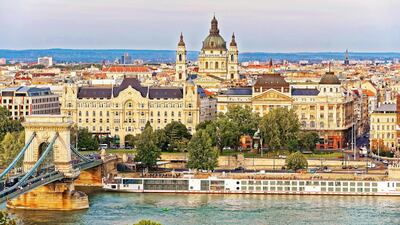Last summer, I noted in this column how with property prices cooling in London after the Brexit referendum, it was time to look further afield and consider the capital cities of the countries that joined the European Union in 2004, among them Budapest, Prague and Warsaw.
But the article warned: "Don’t expect Budapest property prices to spike by 30 per cent like Dubai in 2013."
This turned out to be correct for 2016, although an 18.4 per cent spike in Budapest prices to US$1,800 per square metre, according to index.hu, was pretty dramatic. Across Hungary the average house price increase was actually a little lower than in 2015 at around 10 per cent.
"In the last two to three years downtown prices were rising quickly but who knows what will happen in the future?" warned the architect who just completed my own refurbishment project in Budapest. "Previously the prices were very low for years. This might happen again."
That did sound rather like my scepticism of last year may have proved to be unfounded. House prices can and do rise for decades in the right circumstances.
In the United Kingdom, I sold my place in London in 1998 thinking it might be the top of the market - house prices are up by 300 per cent since then.
Is Budapest, and some other cities in the former eastern Europe, undergoing the kind of structural change in property valuations that happened in many emerging economies in the past?
One person from the Arabian Gulf who got this right early was the Dubai billionaire Khalaf Al Habtoor. He bought two prime hotel properties in Budapest five years ago and, more recently, added a couple of office complexes to his portfolio.
Indeed, Arab investors have been quietly snapping up iconic properties such as the Four Seasons hotel by Oman's sovereign wealth fund and the high-end Buddha-Bar Hotel and the historic Párizsi Udvar building by Zuhair Awad and Sameer Hamdan, who founded Mellow Moods Hotels in 1997.
Some experts say this might be like London in the 1970s when the oil crisis depressed house prices and the oil-rich Arabs bought up swathes of high-end properties in Mayfair, Kensington and Knightsbridge. Certainly it has been foreign money boosting prices in central Budapest as they are already becoming out of reach for local residents whose salaries have lagged behind rising prices.
That said, average national salaries in Hungary rose by 10 per cent last year, a sign of the general dynamism of the national economy under its controversial prime minister Viktor Orban, who has attracted serious multinational investments into the country with his business-friendly regime.
Since 2010 his economic policies have given Hungary the lowest income and corporation taxation in Europe at 15 per cent. There are no annual property taxes payable, nor capital gains tax on real estate owned for more than five years by individuals.
Rental yields of 5 per cent to 6 per cent on apartments are also attractive, while those exploiting central Budapest’s appeal as a tourist destination can do even better as Airbnb landlords.
I met a British developer called John Gorst whose Hungarian property portfolio founded in 1998 generates around $350,000 a year. A Cambridge-educated economist, he boasts an impressive record as a global property developer, and sees at least another two to three years of upside in Budapest.
Indeed, he contacted me looking for co-investors in a project to take over a whole block of 28 apartments with three levels of underground parking just off the Oktogon square on the famous Andrassy Avenue in the centre of Budapest, with a view to creating a serviced-apartment complex.
Another angel investor with a good record for shrewd investments, Jonathan Harrison, the author of Angels & Entrepreneurs, also looked me up in Budapest the following week. Both professional investors had spotted my previous article about Budapest in The National.
Is this the smart money moving into town? Actually Mr Gorst’s existing Hungarian property empire is entirely outside the capital city and he definitely wants to move in.
The bottom line for investors in property in central Europe is that real estate can still be bought here for a fraction of the cost of the world’s most expensive property markets.
Budapest, for example, was once up there with Paris and Vienna. It still needs a lot of investment in restoration projects for its grand buildings and boulevards to make this happen again.
But facade by facade, apartment by apartment, this is happening. What used to be a ruin is becoming a grand old European city again, albeit with a lot of young tech start-ups and a vibrant urban lifestyle to match.
This type of multi-decade renaissance will have its ups and downs and crises political and economic. But generally early investors do extremely well.
Peter Cooper has been writing about finance from the Gulf for 21 years

